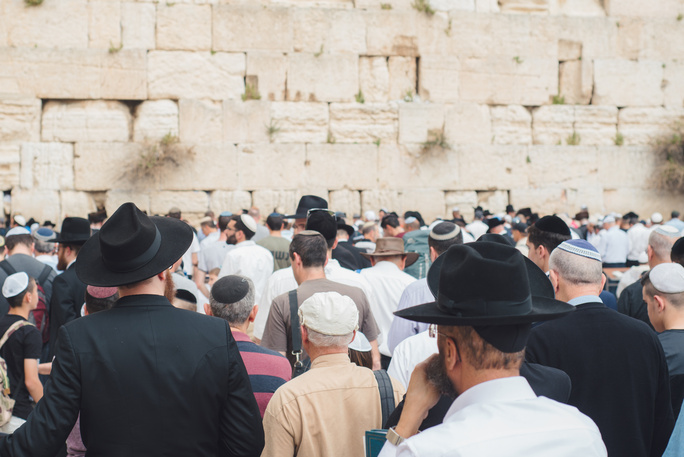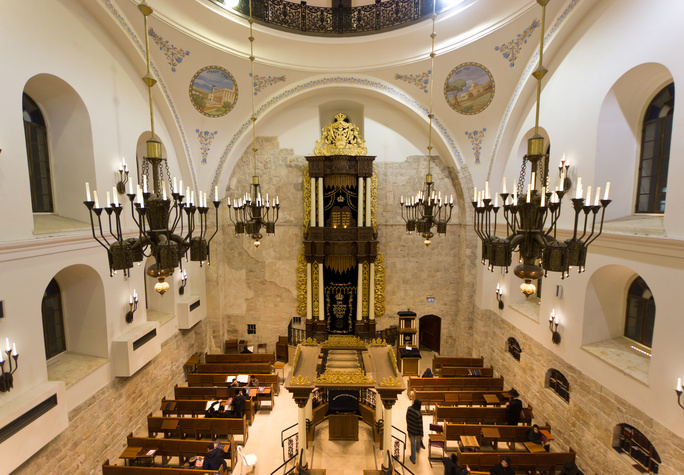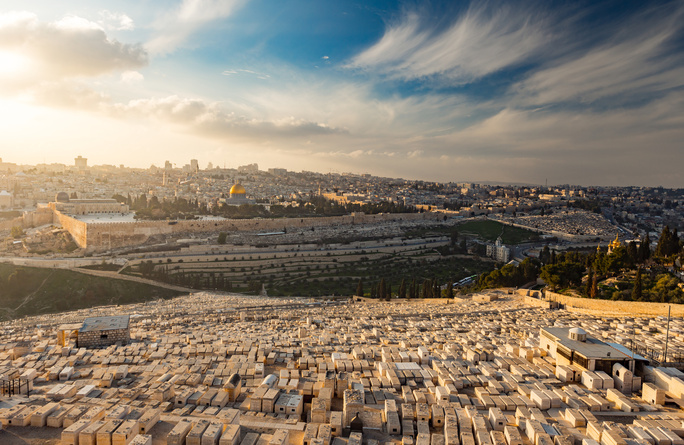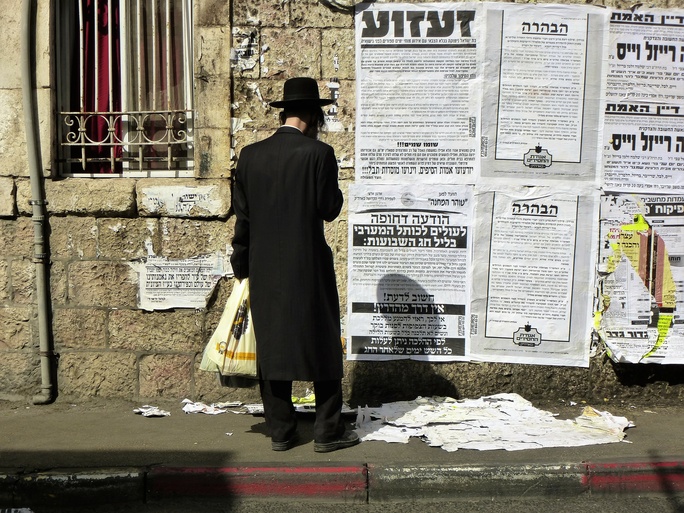As a follower of Jesus who is interested in Israel (after all, you made it as far as this site) you may have come across the term ‘Messianic Judaism’. Once shrouded in mystery, today this term – and movement – is not just more public, but more widespread, too! Intriguing many, and maybe offending some, Messianic Jews are growing in strength and number.
Who are they and what do they believe? Let’s see if we can answer your questions.
What does Messianic mean?
Broadly speaking, the word messianic is an adjective that speaks of a hope for and belief in the Messiah or a savior. Moreover, the Hebrew word for Messiah, pronounced mashiach, means “the anointed one.”
Usually, the Messiah figure refers to the promised Deliverer of the Jewish people, as prophesied in the Hebrew Bible. Those who hope for the Messiah expect an age of peace to follow his coming.
The term messianic is also used to describe a specific movement or group of Jewish people who believe that Jesus is the promised and foretold Messiah. It usually gathers one of two reactions: confusion or rejection.
Some Christians are unfamiliar with Messianic Judaism. Meanwhile the Jewish people often associate Messianic Judaism with a preconceived notion, often negative.
What is the difference between Christianity and Messianic Judaism?
Before we examine the differences between Christianity and Messianic Judaism, I want to emphasize the connection these groups share. Christians and Messianic Jews alike believe that Jesus is the promised Messiah, the Son of God.
The Union of Messianic Jewish Congregations (UMJC) further describes this kinship:
“Together the Messianic Jewish community and the Christian Church constitute the ecclesia, the one Body of Messiah, a community of Jews and Gentiles who in their ongoing distinction and mutual blessing anticipate the shalom of the world to come.”1
The primary difference between these two wings is that Messianic Jews are Jewish followers of Jesus. As such, they maintain their Jewish identity and Jewish life expression. Messianic Jews are descendants, albeit distant by this point in time, of Abraham, Isaac and Jacob.
Most Messianic Jews would not consider themselves “converts” to Christianity.
“Messianic Judaism is that branch of Judaism which claims that Yeshua is the Messiah of Israel and that Judaism is best expressed in and through Him. It is Judaism, in its teaching, worship, and way of life, understood and practiced in the light of the Messiah Yeshua,” offers Dr. David Rudolph.
Is a Messianic Congregation the Same as a Church?
One of the core ways Messianic Jews maintain their Jewish identity is through attending and serving within Messianic synagogues and congregations.
Messianic congregations are places of worship that gather usually on Saturdays (Shabbat) or Friday evenings (marking the beginning of Shabbat). The members can include Messianic Jewish believers in Jesus as well as non-Jewish (gentile) believers.
Messianic Jewish congregations are also distinct from mainstream churches in that they encourage Jewish followers of Jesus to honor the Shabbat, Jewish holidays, and life cycle observances. A number of Churches partner with and honor the Jewish people, while also observing Biblical holidays. This is a great example of the kinship I referred to earlier.
But this is not to say that a Messianic congregation is the only place of worship and community for Messianic Jews. A very large number of Jewish believers are a part of the global church, but they still identify as Jews.
Messianic Congregation vs. Jewish Synagogue
There are generally two primary distinctions that set Messianic congregations apart from traditional Jewish synagogues.
A traditional Jewish synagogue does not recognize Jesus as the Messiah, and the service and liturgy reflect it. Secondly, Jewish people stick to the Hebrew Bible for their scriptures – which is what Christians call the Old Testament.
In contrast, a Messianic congregation does embrace Jesus as Messiah. And Messianic congregations consider the New Testament as the Word of God as well, along with the Hebrew Scriptures (Old Testament).
Messianic Judaism and Replacement Theology
You may wonder what replacement theology even is. In short, replacement theology maintains that the Church has replaced or become the new Israel. Other names of replacement theology are supersessionism and fulfillment theology.
“Simply, this suggests that wherever the word ‘Israel’ is used in the Bible it now refers to the Church, or the Church is the inheritor of all the blessings and promises given to the Jewish people.” 2
This is not to say that all Christians or the Church in its entirety embrace Replacement Theology. Yet sadly, many Christian teachers and pastors unknowingly uphold this position because of its prevalence throughout history. And it influenced broader aspects of Christian theology.
However, Messianic Judaism represents both a theological and lived response to this false teaching. It stands in direct opposition to replacement theology.
Firstly, it teaches a more accurate view of God’s plan for Israel. And secondly, Messianic Judaism encourages Jews who believe in Jesus to maintain their connection to their people, their culture, and their heritage.
What do the Jews believe about the Messiah?
The expectations are not universal across Judaism and that not every Jewish person believes or accepts the same teachings. There is a wide range of Messianic beliefs and understandings embraced as well as rejected. In fact, Judaism may include just as many differing viewpoints as does the Church!
Here are several expectations that many Jewish people have of the Messiah:
- The Messiah will usher in and rule a time of universal peace (Isaiah 2:1-4, 9:5, Amos 9:13-15).
- He will be a descendant of King David, a judge and political leader (Isaiah 11:1-4, Jeremiah 23:5-6, Ezekiel 34:11-13).
- The Messiah is to be a strong military warrior (Eichah Rabbah 2:2).
- His arrival depends on the people of Israel (Babylonian Talmud, Sanhedren 98a).
- The Messiah will rebuild the Temple in Jerusalem (Ezekiel 37:26-28).
- He will gather all Jews back to the land of Israel (Isaiah 43:5-6) and restore the authority to rule over Israel as a political leader.
- The Messiah will bring about religious and cultural unity.
- His coming will indicate the end of the earth.
Generally, Messianic Jews affirm most traditional Jewish beliefs about the Messiah. However, Messianic Judaism is unique because it accepts that Messianic prophecies in the Hebrew Bible relate to Yeshua (Jesus). And that was and will be manifested in both the first and second coming of the Messiah, as outlined in the New Testament.
Messianic Jews in Modern Israel
The modern State of Israel is still relatively young and its population represents various countries and diverse backgrounds. And yet in spite of the diversity, in large part Messianic Jews in Israel face various types of persecution. They are frequently labeled as being part of a cult.
Although usually not violent in the type of persecution they endure, “Messianic Jewish immigrants may find resistance in their attempts to make Aliyah and, if already citizens, may be discriminated against in the marketplace and experience ostracism by colleagues”, explains Akiva Cohen.3
It used to be the reason why most Messianic congregations had practically no online presence. For a foreigner, no matter how supportive, it was difficult to connect with local believers. But as the circles grew and became stronger, their message became more public.
Today, almost every congregation has a website or at least a Facebook page. The Messianic believers learned to deal with opposition, especially as they grow their outreach programs. What’s important is that the outreaches are effective! And the congregations tend to hold services in more than one language.
The Body of Messiah in Israel and Worldwide
Messianic Jews in Israel have their faith as common ground. But how that faith is expressed, the languages they speak, and their family backgrounds can be quite diverse.
“Hebrew is Israel’s national language, nearly 25 percent of the population speak Russian and 20 percent Arabic. Messianic congregational services are held in Hebrew, Russian, English, Amharic, French, Spanish, etc.”4
Messianic Judaism has a long, rich, and complicated history, going back to the time of Jesus. Today, thousands of Jewish people around the world have become followers of Jesus. They affirm Him as the promised Messiah, and worship in a Messianic Jewish congregation or in a church.
Along with their gentile brothers and sisters, these Jewish believers are part of the beautiful tapestry that comprises the Body of Messiah. Messianic Jews seek to love God and share His Son Jesus with those around them.
Connect with Believers in Israel Today!
Are you looking for a way to get started blessing Israel financially? FIRM has a simple way to start putting kingdom investment into impacting lives in Israel.
The Tribe is a passionate and faithful group of monthly donors on a mission to transform lives in Israel through the love of Jesus. Join the Tribe today: firmisrael.org/thetribe
Bibliography
- “Defining Messianic Judaism.” Union of Messianic Jewish Congregations, Online: https://www.umjc.org/defining-messianic-judaism. Accessed 20 July 2021.
- “Replacement Theology.” Gateway Center for Israel, https://centerforisrael.com/papers/replacement-theology/. Accessed 21 July 2021.
- Rudolph, David, and Joel Willitts, editors. Introduction to Messianic Judaism. Zondervan Academic, 2013, p. 113.
- “Messianic Jews in Modern Israel.” Jews for Jesus, https://jewsforjesus.org/publications/havurah/messianic-jews-in-modern-israel. Accessed 20 July 2021.



